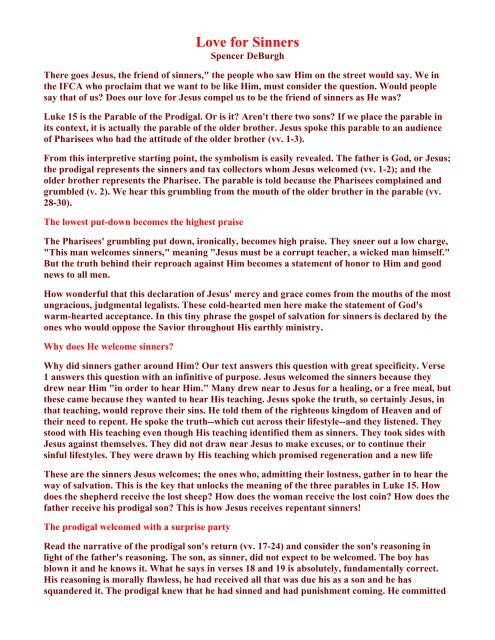The Heart of God The Heart of the Believer
The Heart of God The Heart of the Believer
The Heart of God The Heart of the Believer
You also want an ePaper? Increase the reach of your titles
YUMPU automatically turns print PDFs into web optimized ePapers that Google loves.
Love for Sinners<br />
Spencer DeBurgh<br />
<strong>The</strong>re goes Jesus, <strong>the</strong> friend <strong>of</strong> sinners," <strong>the</strong> people who saw Him on <strong>the</strong> street would say. We in<br />
<strong>the</strong> IFCA who proclaim that we want to be like Him, must consider <strong>the</strong> question. Would people<br />
say that <strong>of</strong> us? Does our love for Jesus compel us to be <strong>the</strong> friend <strong>of</strong> sinners as He was?<br />
Luke 15 is <strong>the</strong> Parable <strong>of</strong> <strong>the</strong> Prodigal. Or is it? Aren't <strong>the</strong>re two sons? If we place <strong>the</strong> parable in<br />
its context, it is actually <strong>the</strong> parable <strong>of</strong> <strong>the</strong> older bro<strong>the</strong>r. Jesus spoke this parable to an audience<br />
<strong>of</strong> Pharisees who had <strong>the</strong> attitude <strong>of</strong> <strong>the</strong> older bro<strong>the</strong>r (vv. 1-3).<br />
From this interpretive starting point, <strong>the</strong> symbolism is easily revealed. <strong>The</strong> fa<strong>the</strong>r is <strong>God</strong>, or Jesus;<br />
<strong>the</strong> prodigal represents <strong>the</strong> sinners and tax collectors whom Jesus welcomed (vv. 1-2); and <strong>the</strong><br />
older bro<strong>the</strong>r represents <strong>the</strong> Pharisee. <strong>The</strong> parable is told because <strong>the</strong> Pharisees complained and<br />
grumbled (v. 2). We hear this grumbling from <strong>the</strong> mouth <strong>of</strong> <strong>the</strong> older bro<strong>the</strong>r in <strong>the</strong> parable (vv.<br />
28-30).<br />
<strong>The</strong> lowest put-down becomes <strong>the</strong> highest praise<br />
<strong>The</strong> Pharisees' grumbling put down, ironically, becomes high praise. <strong>The</strong>y sneer out a low charge,<br />
"This man welcomes sinners," meaning "Jesus must be a corrupt teacher, a wicked man himself."<br />
But <strong>the</strong> truth behind <strong>the</strong>ir reproach against Him becomes a statement <strong>of</strong> honor to Him and good<br />
news to all men.<br />
How wonderful that this declaration <strong>of</strong> Jesus' mercy and grace comes from <strong>the</strong> mouths <strong>of</strong> <strong>the</strong> most<br />
ungracious, judgmental legalists. <strong>The</strong>se cold-hearted men here make <strong>the</strong> statement <strong>of</strong> <strong>God</strong>'s<br />
warm-hearted acceptance. In this tiny phrase <strong>the</strong> gospel <strong>of</strong> salvation for sinners is declared by <strong>the</strong><br />
ones who would oppose <strong>the</strong> Savior throughout His earthly ministry.<br />
Why does He welcome sinners?<br />
Why did sinners ga<strong>the</strong>r around Him? Our text answers this question with great specificity. Verse<br />
1 answers this question with an infinitive <strong>of</strong> purpose. Jesus welcomed <strong>the</strong> sinners because <strong>the</strong>y<br />
drew near Him "in order to hear Him." Many drew near to Jesus for a healing, or a free meal, but<br />
<strong>the</strong>se came because <strong>the</strong>y wanted to hear His teaching. Jesus spoke <strong>the</strong> truth, so certainly Jesus, in<br />
that teaching, would reprove <strong>the</strong>ir sins. He told <strong>the</strong>m <strong>of</strong> <strong>the</strong> righteous kingdom <strong>of</strong> Heaven and <strong>of</strong><br />
<strong>the</strong>ir need to repent. He spoke <strong>the</strong> truth--which cut across <strong>the</strong>ir lifestyle--and <strong>the</strong>y listened. <strong>The</strong>y<br />
stood with His teaching even though His teaching identified <strong>the</strong>m as sinners. <strong>The</strong>y took sides with<br />
Jesus against <strong>the</strong>mselves. <strong>The</strong>y did not draw near Jesus to make excuses, or to continue <strong>the</strong>ir<br />
sinful lifestyles. <strong>The</strong>y were drawn by His teaching which promised regeneration and a new life<br />
<strong>The</strong>se are <strong>the</strong> sinners Jesus welcomes; <strong>the</strong> ones who, admitting <strong>the</strong>ir lostness, ga<strong>the</strong>r in to hear <strong>the</strong><br />
way <strong>of</strong> salvation. This is <strong>the</strong> key that unlocks <strong>the</strong> meaning <strong>of</strong> <strong>the</strong> three parables in Luke 15. How<br />
does <strong>the</strong> shepherd receive <strong>the</strong> lost sheep? How does <strong>the</strong> woman receive <strong>the</strong> lost coin? How does <strong>the</strong><br />
fa<strong>the</strong>r receive his prodigal son? This is how Jesus receives repentant sinners!<br />
<strong>The</strong> prodigal welcomed with a surprise party<br />
Read <strong>the</strong> narrative <strong>of</strong> <strong>the</strong> prodigal son's return (vv. 17-24) and consider <strong>the</strong> son's reasoning in<br />
light <strong>of</strong> <strong>the</strong> fa<strong>the</strong>r's reasoning. <strong>The</strong> son, as sinner, did not expect to be welcomed. <strong>The</strong> boy has<br />
blown it and he knows it. What he says in verses 18 and 19 is absolutely, fundamentally correct.<br />
His reasoning is morally flawless, he had received all that was due his as a son and he has<br />
squandered it. <strong>The</strong> prodigal knew that he had sinned and had punishment coming. He committed
















